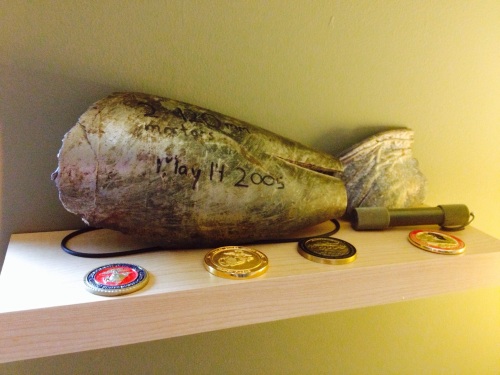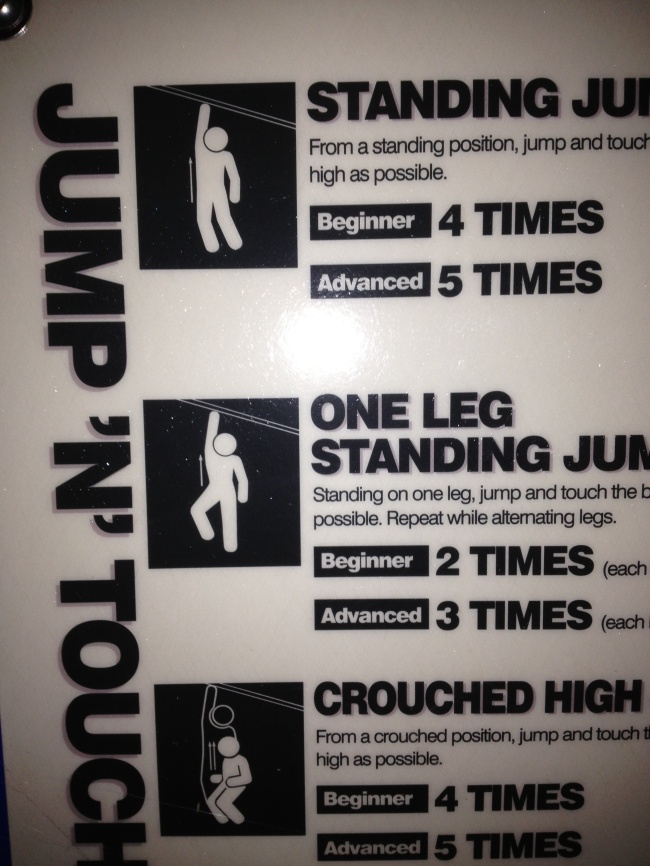This comic strip was sent to me by the other half of Werdguys. You can read it for yourself at http://ow.ly/i/2X8Qm/original but basically it tells a very troubled story of how the Bible came to be. The steps listed suggest the Old and New Testaments we read today are based on myths ripped off from other cultures that were altered countless times by storytellers before they were recorded, then altered countless more times by careless scribes and revised and edited again by political powers. Only after centuries of edits, sloppy mistakes, alterations and agendas did the Bible come to rest in the state we know.
The comic is convincing at first. The characters are cute. The phrasing is condescending enough that you really want to side with the author so that you aren’t on the dumb side of the topic. And enough history is provided that most readers would assume the conclusions are based on raw facts. The only problem: most of what’s presented in this comic strip is completely wrong. To be fair, there are some aspects of truth presented. For example, many biblical accounts existed in an oral tradition before being written down, eventually the printing press was invented, we have a Bible and…that’s about it.
I’d like to discuss some flaws I see in this comic. I’ll do so from two different angles: factual flaws and philosophical flaws. I’ll say more on this at the end of this response, but let me quickly say here that I am not opposed to people raising genuine questions and criticisms to the Bible. I’ve done so myself many times throughout my faith. However, when objections are raised they should be based on facts or solid reasoning, neither of which is present here.
Factual Problems
There are arguments that could be made against the propositions in panels 1 and 2, but for the sake of this response lets start with panel 3. It is true that most biblical accounts existed in an oral tradition before they were recorded. However, to equate this to a giant game of telephone is misleading and irresponsible. This position does not take into account the drastic difference in how information is often conveyed today and how information was often conveyed in ancient near-eastern culture. The Jewish oral tradition was hardly a game of telephone in which each new storyteller could accidentally insert changes without repercussion or intentionally add changes for preference.
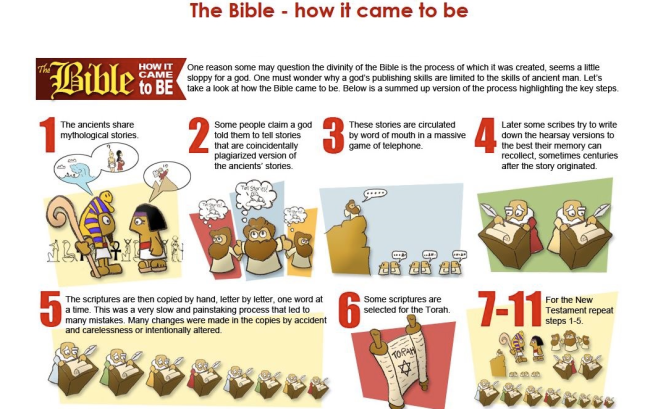
We are talking about a culture that valued rote memorization on level we can barely comprehend. We are talking about a culture in which most boys had the entire Torah (Genesis to Deuteronomy) memorized by the age of 10, some boys additionally memorized the Psalms and some other wisdom by the age of 12, and a few could recite the entirety of the Jewish scriptures by age 14. Ancient Jews would recite stories over and over again in front of their teachers to ensure they could repeat them verbatim, without error. That’s the most boring game of telephone ever.
Panel 4 suggests that at some point some dense, bumbling scribes scratched their heads trying to remember a story they’d heard years ago and ended up scribbling down a spotty version of a story they barely knew. Again, this simply is not true. The scribes knew the stories well. If they were not among those who had memorized them, they could easily have someone recite the account word for word, as slowly as they needed. In reference to the formation of the New Testament it was not centuries that passed before the accounts were written down, but a matter of years. Mark, for example, was probably written as soon as 30 years after the death of Jesus. Not only does that leave less room for the “telephone” effect to take place, but it also means if the gospel writers had changed what happened there would have been many people still alive to throw a flag. There is no indication this is the case.
Panel 5 says the process by which the Old Testament books were copied led to many mistakes. This assumes the ancient scribes took as much care in copying what they believed to be the Word of God as a junior high student takes in copying notes in Home Economics. In actuality the process by which the ancients copied the scriptures was so regimented that a mistake or change making it through the editorial process is almost impossible.
Indeed, the scribes copied the texts, letter by letter, word by word. They did this meticulously and with great focus and scrutiny. Here are some of the measures put in place to make sure they coped the text correctly.
- The texts were organized into block format so that each line and page would have the exact same amount of characters as the master copy.
- The scribe was mandated to reference the master copy before beginning each and every letter. He was not allowed to write even one letter from memory or assumption. For example, if a scribe had copied “He rode in on a hors” he would not write the obvious “e” without first checking the master copy.
- The materials used (the ink and the animal skin scroll) had to be of a certain kind and quality to ensure the letters would not bleed or fade.
- They would say each word aloud after writing it.
- A scribe was not allowed to speak to anyone, regardless of their rank or importance, while copying the scriptures.
- If two letters touched each other the page was seen as invalid.
- Once a copy of a book was finished it would be reviewed within 30 days. If as many as 3 mistakes were found (in the entire book) the entire document would be set aside as invalid.
- Invalid texts were destroyed.
There are cases in which a text was intentionally altered by a scribe or group of scribes acting under the direction of a superior. These are called tiqqune sopherim, or “emendations of the scribes”. We know these to be intentional because they are identified by annotations in the margin of the text. Yep. The scribe left a note saying, “I changed this letter because…” And how many of these changes exist in ancient copies of the Old Testament? Somewhere between 7 and 18 depending on which text you’re looking at.
The reality is the sheer number of ancient biblical manuscripts provides amazingly compelling evidence for the scriptures’ reliability. Let me explain it this way. Suppose we live in the year 1234, long before the printing press was invented. I write you a letter and then hand copy a duplicate for myself. I find out a month later that your letter never arrived. It was eaten by pirate ninja bandits before it got to you. So I retrieve my duplicate and begin to copy you another letter, but as I do I notice a discrepancy. A line is missing with the details of a story. I had, in the letter I sent to you, recounted a story about my birthday party at Ye Ole’ Water Park. I went down a water slide backwards and got reprimanded by Athelardus the life guard. But now I can’t remember if that happened on the Saxony Splunker or the Druid Drowner and that line is missing from my copy of the letter. There is no way at this point to recover that information. However, suppose that I had written 20 identical letters to 20 friends. When I find out yours is lost I am able to recover the original information because there are 19 other copies out there. In fact, I can collect all 19 copies, compare them to each other and know with a great deal of certainty that the parts that correspond truly reflect what was originally written.
How does that correlate to the reliability of scripture? Easy. There are more manuscripts of biblical texts than of any other ancient document. Many, many more. There are more than 24,000 ancient, handwritten copies of New Testament texts as well as thousands of Old Testament manuscripts. Scholars such as Ezra Abbot and A.T. Robertson place the consistency of ancient biblical texts at 99% or higher. Most of the inconsistencies boil down to changing the spelling of a person’s name or the name of town. A small fraction of the less than 1% of text differences could possibly said to change the meaning of the text in any way.
Now consider the following. As I said there are many more manuscripts of biblical texts than of any other ancient document. Second place in this field goes to the Iliad by Homer, for which we have 643 ancient manuscripts. There is a gap of about 500 years between Homer’s life and the earliest copy we have of his writing and these copies are about 95% consistent to each other (keep in mind the Bible has at least 24,000 manuscripts with 99% accuracy). There are only about 49 manuscripts of Aristotle’s works with the earliest one appearing 1,400 years after his death. We have only 7 manuscripts from Plato. For both Aristotle and Plato the amount of text available is so low that it is difficult to generate a consistency rating. Yet nobody ever doubts the authenticity or reliability of these works. When is the last time you heard a professor of philosophy say, “This is fairly meaningless because these texts have been altered so many times it is unreasonable to assume this is actually what Plato said”? No! We trust the reliability of documents for which we have fewer copies that are less consistent and mock the idea of trusting the reliability of the document for which we have the most copies that are the most consistent.
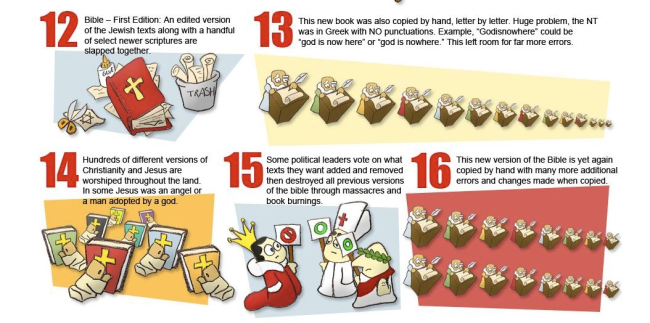
Panel 12 provides no real data to be confirmed or refuted. The only thing to be said here is that the language “slapped together” is clearly an intentional attempt to undermine trust in the process by making it appear haphazard and careless. In reality the process by which texts became part of a recognized New Testament was very tedious. The early church was extremely careful in this process evaluating texts by criteria such as: apostolic authorship, orthodoxy (is it consistent with what the church believes), unity (does it contradict the Old Testament or other apostolic teachings), as well as several other measurements. Then there is the fact that numerous church councils, such as the Council of Laodicea, the Council of Hippo and the Council of Carthage all convened and discussed this topic in a formal setting. That is not being “slapped together.”
Panel 13 points out that the earliest copies of the Greek New Testament did not include spaces leading to the “godisnowhere” problem. By the way, ancient Hebrew was also written without spaces or punctuation. This was to save space on very expensive animal hide scrolls. So, if this were indeed a problem then I just pointed out it’s a problem for the Old Testament as much as it is for the New. However, I’m not too worried about it. If one reads contextually these problems almost always resolve themselves.
Let me throw out my own version of godisnowhere to show you what I mean. Consider a text that says draftswet. Is this talking about some drafts that got wet (He got the draftswet)? Is it referring to Dr. Aft, who is wet (get a towel, draftswet)? Or maybe it is referring to something Dr. Aft owns that got wet (get draftswet coat). Without context any of these could be the case. But this amazing thing happens when you plug the word or phrase into a larger idea. CONTEXT! If I said, “I opened my brief case in court, after which my assistant spilled water on my folders and got my draftswet” is there really any chance at all I’m talking about Dr. Aft’s wet coat? Let’s not be silly.
Panel 14. Not really. There were pockets of believers who adopted erroneous beliefs. However, by and large these pockets were identified as being in error by the church at large. The orthodox doctrines of Christianity have been held consistently by the Church since the time of Jesus. The fact that some believed different things has no bearing on the reliability of the Christian faith. For example, suppose I say I believe Elvis is hanging out with Tupac in Fargo, ND. Does that mean everything written about Elvis and Tupac is unreliable and stupid because I’ve developed a wrong belief about them? Hardly.
Panel 16, see previous arguments.
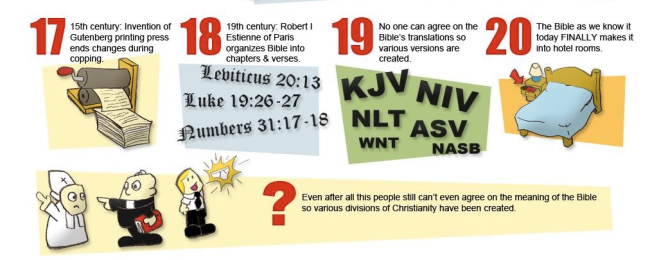
Panel 18 is perhaps the most entertaining. According to this block in the 19th century a Frenchman named Robert I Estienne put the Bible into chapter and verse. Where to start? Estienne was in fact a real person. He lived in the 16th century (1503-1599), not the 19th century. Only off by 300 hundred years. He worked in printing and is credited with adding verse numbers, but had nothing to do with chapters. That happened a few years earlier…in the 13th century. Only off by 600 years. In fact Stephen Langton first began the process of dividing the scriptures into smaller, easier to handle portions (chapters) around 1227 C.E.
If I were inclined I could point out that ancient rabbis were actually the first to conceive of a way to implement markers that would organize the scriptures. They organized them by paragraph, putting the letter Pe in front of paragraphs that started a new line and the letter Samekh in front of paragraphs that started part way through a line. During the exile Jews divided the Torah into 53 parts to be read through in a year. In the 4th century the New Testament was organized into topical categories. The Bible was not organized in the 19th century by Estienne. It has been “being” organized for thousands of years, but the chapterization, which is referred to in the comic, happened in 1227.
Panel 19 suggests the only reason various translations exist is because the texts are so confusing and open to interpretation that nobody can agree on any of it. This is not the case. Most of it comes down to preference. I agree that the vast majority of the King James Bible was translated properly. But I don’t speak 1611 English, so I don’t prefer it. I think the NASB is one of the most accurate English translations, but can read a little choppy at times, so I don’t use it for certain occasions. When I preach a sermon I may use texts from 4 or 5 translations because I appreciate many of them. To imply there is only one correct way to translate text from one language with its own idioms and unique characteristics into another language with its idioms and characteristics is incredibly simplistic and shows a deep lack of understanding in the translation process.
Philosophical Problems
In addition to the fact that this comic contains numerous untruths, it is presented in a way that is full of philosophical fallacies.
The Straw Man Argument is when an arguer misrepresents the views of the opposing side, argues against this falsified version of the other side, and then concludes the opponent must be wrong. This is exactly what has happened in this comic strip. I’ve demonstrated how many propositions and implications are not based in any reality whatsoever. If the way the scriptures came into being was indeed this sloppy then the author’s conclusions would be correct. However, the process presented has been intentionally dumbed down and, in some cases, completely altered in order to create an opponent much easier to argue against.
Allow me to use another straw man argument to show demonstrate the degree to which this author falsified the canonization process. One reason Starbucks is so successful is the consistency with which they make coffee. You can go into any store, order your coffee and feel confident that your coffee will taste like you expect it to. But suppose I make the following argument.
Coffee beans are grown all over the world in different and uncontrollable environments. All sorts of factors change the chemical makeup of the beans including weather, human factors like pollution, and environmental factors like monkeys pooping around trees. There’s no way to tell if the beans from any batch will have the same flavor as beans from the same source a few months earlier. Then these beans are picked by farmers with all sorts of contaminants and residue on their hands. There’s absolutely no way to tell if they are spreading to the beans remnants of their bacon cheeseburger lunch.
These beans are then packed in containers that undoubtedly transfer metallic and plastic flavors. The beans that make it to any local Starbucks store have already been contaminated and altered in who knows how many ways. Some poor goober orders a coffee with milk and vanilla. A zit faced college sophomore, who is distracted thinking about his chemistry final types the order wrong and starts making a decaf coffee with soymilk and toffee nut syrup. Not only does he make the wrong drink, but he’s also in such a rush to keep up with the crowd waiting in line that he guesses the measurements of the ingredients without taking time to actually check them. The beans, which we have no idea of knowing how they will taste, are brewed into coffee using local water, which is completely different from city to city. Perhaps this town has a lot fluoride in its water. Perhaps this town has a lot of lime. You just don’t know. Finally, you are handed your incorrect order made of ingredients and water that has been altered hundreds of times and which contains countless contaminants that change the flavor. The bottom line is when you order a coffee from Starbucks you have no idea how it will taste.
This is clearly absurd. Again, one of Starbucks’ strengths is the consistency of their coffee regardless of where you order it. However, it is easy to spin the details of the process in such a way that casts doubt on the entire thing. If this false situation I invented actually reflected the way most cups of coffee were made then my statements might have some weight. But they don’t. I’ve invented a ridiculous situation that is easy to mock and argue against.
The Appeal to Emotion argument is just what it sounds like. A person’s arguments are intended to appeal to emotions rather than reason. Here’s a quick example. “My cousin was a straight A student. She was set to go to college on a full scholarship. She volunteered every weekend at the homeless shelter. Her goal after college was to develop a youth center to keep kids out of gangs. I’ve never known anyone as selfless and full of potential as her. She was shot by man robbing a gas station. Therefore, all guns should be taken from private citizens.” My argument does not evaluate the information on the issue or investigate any aspect of the gun debate that has to do with reason. It simply tries to stir up sadness and sympathy in hopes that your emotions will lead you to agree with me.
This comic is one giant appeal to emotion from start to finish. The message (sometimes implicit and sometimes explicit) is that the entire process by which the scriptures came to be is filled with blundering idiots and malicious evildoers who messed up every possible step. Consider the volume of negative descriptions and words used in negative connotations in this one page comic:
a little sloppy
limited
mythological
some people claim
coincidentally plagiarized
massive game of telephone
hearsay
best their memories can
centuries after
painstaking
many mistakes
Many changes
accident and carelessness or intentionally altered
slapped together
Huge problem
room for far more errors
different versions
massacres and book burnings
additional errors
no one can agree
FINALLY.
This comic offers no rational justifications for its claims, but relies almost exclusively on an appeal to emotion. This document, from start to finish, is dripping with sarcasm, condescension and the general implication that “This is so stupid that nobody with a brain could believe this.” Building that implication into the language and pictures puts a false dichotomy onto the reader. He or she may feel like the only two viable options are hold onto faith and be stupid or abandon faith and join the smart club. And since the need to fit in, be accepted and be respected are among a person’s chief emotional needs he or she may choose to side with the cartoonist simply to avoid being labeled stupid. That, ladies and gentlemen, is an appeal to emotion and it has no bearing on whether or not a position is true.

At the bottom of the page the cartoonist adds some concluding thoughts that basically express the idea that God is either incapable of coming up with a better plan to deliver his word to people, or too dumb to come up with a better plan. Why would the all-powerful God rely so much on human involvement in the delivery of his word, when involving humans means it will almost certainly be messed up? Why didn’t God just will the Bible into being like he supposedly did light and matter?
Think about that for a second. Why did God let people be involved in the development of his written word? It’s probably because most of it is narrative or dependent on contextual situations to exist. In other words, the vast majority of God’s word to humanity is wrapped up in the history of humanity. This kind of requires human involvement. So, why didn’t God poof the book of Habakkuk into existence at the beginning of time? Because the book’s messages of God’s faithfulness to his promises and his judgment on those who rejoice in evil is much better understood in the context of those things actually happening. In my opinion the most powerful message of Habakkuk is God’s patience and gentleness with his followers who have questions and wrestle with the idea that “God’s doing it wrong”. We see this in Habakkuk’s questions, like “How long will you ignore me God?” (Hab 1:2).
If God’s word was nothing more than a list of rules, then perhaps God could have “poofed” it into existence. But it’s not. It’s so much richer and deeper than that. It’s a story. God’s word is the story of him making us and redeeming us, it is full of examples of successes and failures, and its infinitely more about how God relates to us than it is about a list. This kind of story obviously requires human interaction.
As far as the specific question of why did God allow humans to be in charge of recording it instead of it falling out of the divine printing press, I think this is also obvious. To take ownership in something is to love it. If I buy my son a Ninjago Lego set and build the entire thing for him he would probably think it was neat. If, however, I set the box on the floor and say, “I see how this all fits together, and I know how to do this, but let’s build this thing together” then he will love and value it a thousand times more. “He” is in the building of this toy. “He” interacted with it. “He” saw the pieces coming together and when it’s done he will love it. I see the formation of the scriptures the same way. Even if we disregard what I said above about requiring historical human context for the narrative and assume God could have willed the Bible into being apart from human interaction, I really don’t think he would have. God did not need us to be involved, he wanted us to be involved. He wanted to speak through humanity, not just to humanity. He wanted us to be involved in the legos.
One of my son’s chores is to vacuum the rug in the living room. It’s takes him forever to do it. And when he’s done I sometimes have to go back to get some spots he missed. He struggles to wrap the cord up properly when he’s done and to be honest, I could have the thing done in half as much time. But according to the same logic used by this cartoonist the only possible reasons for me having my son go through a long process is because I’m either incapable of doing it myself, or too stupid to figure out how to do it. The third possibility that I’m choosing the longer process for the betterment of my son would not be considered, even though that is indeed the truth. Why did God choose such a long and difficult process to deliver his word? Because that’s what benefits us the most. Can you honestly say you would have an easier time revering the scriptures if I came to you and said, “Here is a list of rules with no context or narrative to give insight. Nobody wrote it. It fell from the sky. Enjoy.”?
Now, I have no problems with someone raising honest, researched and well thought out objections to faith. I welcome friendly conversations from those with different views. But this comic is not based on anything rational. The author simply twisted the history of the Bible into something much easier to dismantle than the truth, then packaged an argument in condescending language hoping people would be moved by the need to be in the cool kids’ club and reject the reliability of the Bible.


